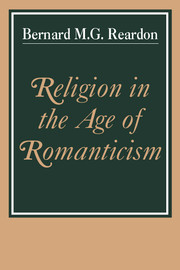Book contents
- Frontmatter
- Contents
- Preface
- 1 Romanticism, idealism and religious belief
- 2 Schleiermacher on the religious consciousness
- 3 Hegel and Christianity
- 4 The idea of God in the philosophy of Schelling
- 5 German Catholic theology in the Romantic era
- 6 Italian ontologism: Gioberti and Rosmini
- 7 Lamennais and Paroles d'un Croyant
- 8 Auguste Comte and the Religion of Humanity
- 9 Ernest Renan and the Religion of Science
- Notes
- Index
7 - Lamennais and Paroles d'un Croyant
Published online by Cambridge University Press: 05 June 2012
- Frontmatter
- Contents
- Preface
- 1 Romanticism, idealism and religious belief
- 2 Schleiermacher on the religious consciousness
- 3 Hegel and Christianity
- 4 The idea of God in the philosophy of Schelling
- 5 German Catholic theology in the Romantic era
- 6 Italian ontologism: Gioberti and Rosmini
- 7 Lamennais and Paroles d'un Croyant
- 8 Auguste Comte and the Religion of Humanity
- 9 Ernest Renan and the Religion of Science
- Notes
- Index
Summary
A paradox of early nineteenth-century romanticism, forced upon it no doubt by the political and social turmoil of the period itself, was the seeming contradiction between its uncurbed individualism and its yearning for a reintegrated and reconstituted society, an ideal ‘collective’ imaginatively projected either behind it into the past or forward into the future. Against the back-cloth of the Revolution, and the socially atomistic rationalism which had so largely contributed to it, it is little wonder that the utopianism of the Romantics should in the main have been conservative. Not that all political conservatism drew inspiration from this source. The reactionary policies of Metternich and the architects of the Holy Alliance were motivated chiefly by fear and jealousy for the privileges of the existing ruling class. But genuinely romanticist political and social theory arose from the urge to maintain or reassert the ties which bound men one to another; ties, however, which had to be compatible also with their liberties. In fact individualism as a socio-political principle was too little adequate to the organic nature and vital needs of human society to be permanently effective, as the Revolution itself had demonstrated. ‘Society’, declared Henri de Saint-Simon, ‘does not live on negative ideas, but on positive’, and pointed back to the middle ages for a paradigm instance of an ‘organic’ social order such as he and his contemporaries desiderated.
- Type
- Chapter
- Information
- Religion in the Age of RomanticismStudies in Early Nineteenth-Century Thought, pp. 176 - 206Publisher: Cambridge University PressPrint publication year: 1985



